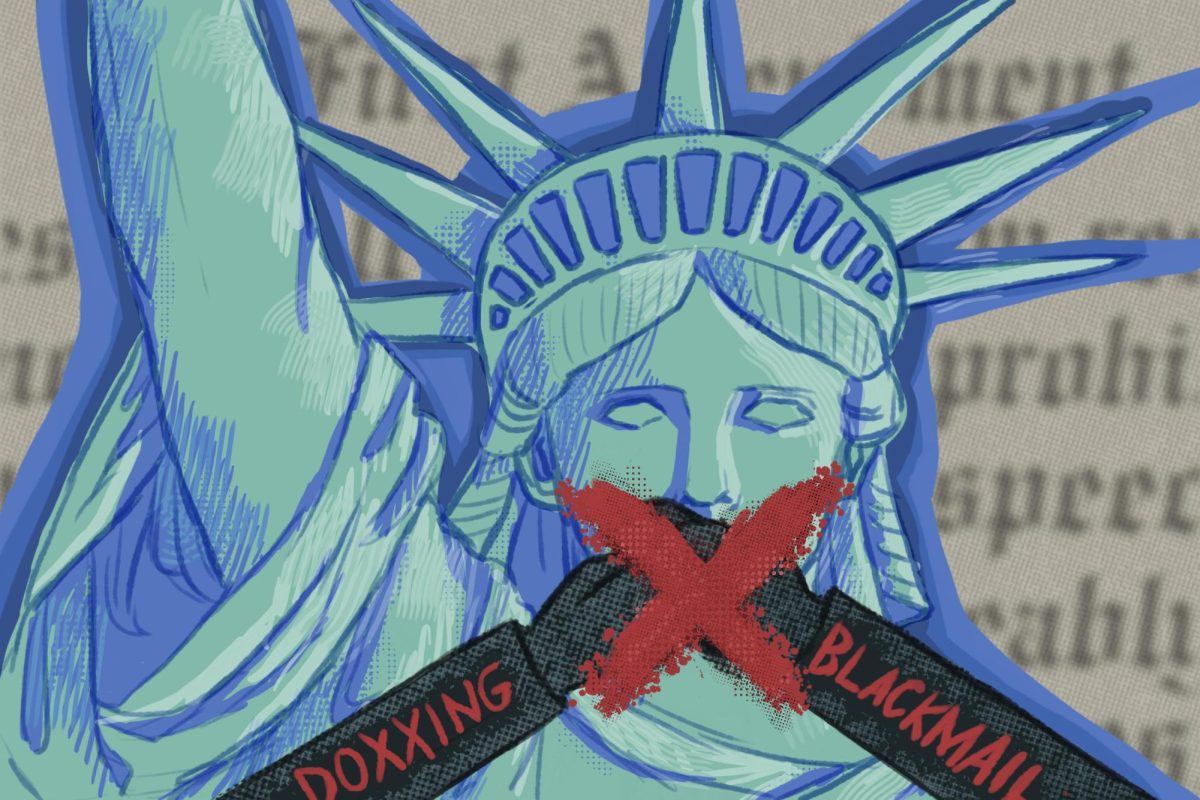The opportunity to engage in civil, respectful discourse is a privilege we share at Harker. The Israel-Hamas conflict has made it clear that this privilege is not prevalent outside of Harker, and that America’s constitutionally-protected right to free speech is conveniently disregarded by the public in times of polarizing divide. In America, it’s become clear that only one opinion has become the right and safe one to have, and any opposing opinion can lead to serious consequences.
Following the Oct. 7 Palestinian militant group Hamas’ attack on Israel, the Harvard Undergraduate Palestine Solidarity Committee released a statement which 33 organizations signed. The statement expressed support for Palestine and held “the Israeli regime entirely responsible for all unfolding violence.” Their letter of support went viral.
Five days later, a “doxxing truck” appeared on the Harvard campus. The truck displayed the names and faces of specific organization members under the title “Harvard’s Leading Antisemites” despite the letter only being signed by organizations and not individual students. Websites popped up throughout the internet with the names and background history of the members linked to student organizations that signed the letter.
In the following days, Harvard donors pulled their fellowship money, and a billionaire couple left the school’s executive board. Wall Street executives and at least a dozen other business executives called for the compilation of a list of the students’ names in order to blacklist them from future hiring processes.
The targeted backlash that individual members affiliated with Harvard student groups received underscores America’s double standard in its title as a champion of freedom of speech and press. In times of serious conflict, the First Amendment is so easily disregarded by the public in order to pave the way for personal attacks and public shaming solely because an individual does not have the “right” opinion.
The disregard for the right of free speech is not only present in the masses. It is also present in the upper levels of the U.S. government. Palestinian House representative Rashida Tlaib was censured by the House of Congress for her criticism of Israel and PM Netanyahu’s actions. One congressman even stated that she “levied unbelievable falsehoods about our greatest ally, Israel, and the attack on October 7.”
This all serves to demonstrate that America has an issue with upholding its Constitutionally-established and esteemed right of free speech, and this issue has lasted for decades now. America’s Red Scare in the 1950s, the period of public hysteria over individuals’ possible connections to Communist ideology that sparked mass media persecution, was the first event that clearly revealed the fragility of the First Amendment.
This presence of this fragility has never been clearer than it is now.
The right to freedom of speech is one of America’s defining features — it should not be a contingent clause on an individual’s rights. Especially in periods of high tensions, every individual in America should be able to speak with the assurance that they will not lose their jobs, their safety and their reputations over their own words.
These unprotected university students’ words were not suppressed, but they faced publicly propagated media prosecution and serious long-term ramifications as a result of association with the letter as well as their views.
The reaction of the public, especially those in power, amplifies a serious message in today’s public forum: Speak at your own risk.
These potential consequences do not represent the true conditions of freedom of speech — they stand as an implicit threat to one’s future should they choose to speak out.
The civil environment within Harker is not prevalent outside of the school, and as we move into the next stages of our lives, understanding those with differing views and not shying away from discussing difficult topics is essential in order to promote cohesion as well as free exercise of our rights. Successful civil public discourse acknowledges the complexities of ongoing social issues and crises and is a stepping stone towards change.
Most importantly, with a clear understanding of our rights, it is necessary to directly call out and be open to hearing different perspectives to build the civil environment inside of Harker outside. Constitutionally protected rights come with the implication that they remain unchanged, no matter the circumstance, and our generation should not be afraid to admonish violations of citizens’ rights and create a civil environment in the public sphere.
This story was originally published on Harker Aquila on November 18, 2023.




































